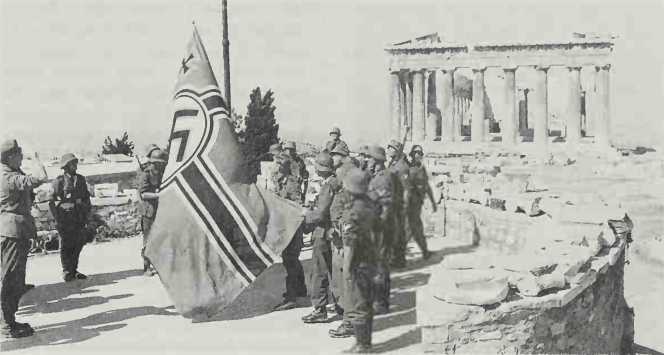
The flag of the Third Reich is hoisted over the Acropolis, Athens, 1941
Greece, first Italian invasion of
(October 28 1940). Despite Hitler’s opposition, Mussolini authorized Prasca, Italian c-in-c in Albania, to invade Greece, expecting little or no opposition. By November 8, the Italian offensive had collapsed in the face of resolute Greek resistance. The Greek counteroffensive started on November 18. They recovered most of their lost territory and advanced a short distance into Albania before winter set in. A small RAF contingent under D’Al-biac was sent from Egypt to support the Greeks.
Greece, second Italian invasion
Of (March 9—16 1941). Mussolini tried to pre-empt Hitler’s invasion of Greece with a further offensive of his own from Albania, mounted with 28 divisions. Fourteen Greek divisions broke the Italian effort, but were exhausted themselves when the Germans struck (April 6).
Greece, German invasion of (April 6 1941). Hitler invaded Yugoslavia and Greece simultaneously to secure his southern flank before his invasion of Russia. Twelfth Army (List), supported by
1,000 aircraft of Luftflotte 4 (Lbhr) attacked Greece. The British Force W (Wilson) - I Australian Corps (Blarney) with 6th Australian and the New Zealand Divisions - was hastily shipped to Greece, and placed under the overall command of Gen Papagos, the Greek Prime Minister and c-in-c, for the defence of the Aliakmon Line. The short campaign was a withdrawal operation in four phases. In the first (April 6-11), the Aliakmon Line was abandoned when the rapid collapse of Yugoslav resistance enabled the Germans to advance through the Monastir Gap. In phase two (April 11-14), the Olym-pus-Servia Line was abandoned when outflanked by the German advance through the Pindus Mountains. Phase three (April 1519) saw the withdrawal to Thermopylae due to the collapse of exhausted Greek divisions on the Albanian front and general decline in Greek morale. During the final phase (April 24—30), Force W was evacuated by sea to Crete and Egypt, and the Germans entered Athens on the 27th. All Greek resistance had collapsed by the end of the month. WGFJ.
Greece, liberation of (October 16 1944). Ill Corps (Scobie) landed at the Piraeus to re-establish the legitimate Greek government as the Germans withdrew from Athens, and to bring supplies to the starving population. On December 3, a communist rebellion broke out in Athens. The Greek Government, the British Embassy and Scobie’s hq were besieged. Reinforcements had to be rushed from Italy to defeat the insurgents in Athens, Salonika and Patras. It took a month of street-fighting to clear the capital. The Communist leaders accepted a negotiated cease-fire on January 15, and a tenuous peace agreement was concluded on February 12 1945.
WGFJ.
Greek Civil War (1946-49). During the German occupation, Greek resistance was dominated by the Communist Party (kke) through the National Liberation Front (eam) and its National People’s Army of Liberation (elas). Following liberation, a communist uprising, December 1944—February 1945, against the National Unity government was suppressed by British troops {see Greece, liberation of) and a tenuous peace established by the Varkiza Agreement, February 12 1945.
Tito’s Yugoslavia facilitated the training of the communist “Democratic Arrny of Greece” under Mar-kos Vafiades (“General Markos”), and from mid-1946, following anticommunist measures by the Populist (Royalist) government of (Constantine Tsaldaris, Markos commenced guerrilla operations into northern Greece from bases in
Yugoslavia, Albania and Bulgaria. Winning control of the rural north and raiding south, the communists inflicted severe losses on government forces, whose position seemed grave when British aid ended in February 1947. In March, however, the establishment of the Truman Doctrine presaged US economic and military aid.
Several other factors combined to defeat the communists. Their kidnapping (“removal to safety”) of children for indoctrination alienated many Greeks; the accession of King Paul in April 1947 rallied royalists; and the insistence of the KKE leader Nikos Zachariades on a “conventional” campaign to seize urban centres weakened Markos’s guerrillas, especially after Yugoslav support ended after the Tito-Stalin rift, June 1948.
From July 1948, government offensives drove the communists back to their northern stronghold on Mount Grammos, where, late in August 1949 - now commanded by John loannides - they were shattered in a final offensive by Marshal Alexander Papagos (18831955). A cease-fire was announced on October 16 1949. RO’N.




 World History
World History









